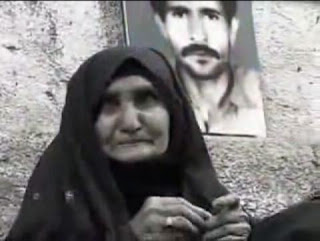 "Missing in Pakistan", a documentary by Ziad Zafar, presents a heartbreaking account of the plight of hundreds of disappeared people and their families in Pakistan. These people are in illegal detention by the intelligence agencies. The documentary is informally circulating in Pakistan and could be downloaded from the net (24 min long, see here)
"Missing in Pakistan", a documentary by Ziad Zafar, presents a heartbreaking account of the plight of hundreds of disappeared people and their families in Pakistan. These people are in illegal detention by the intelligence agencies. The documentary is informally circulating in Pakistan and could be downloaded from the net (24 min long, see here)My quick thoughts:
The documentary is timely and to the point. It correctly points to the two major factors that determine Pakistani politics: the American geo-strategic interests and the politico-economic interests of the military establishment. It is important to note that religious extremism and sectarianism in Pakistan have always been the function of these two factors. The American selfish interests in the region and the failure of political process since the establishment of Pakistan are the real causes behind religious extremism. Busharraf's war on terror is failing. This war is itself a form of and a cause of growing terrorism in the region.
The individuals that are involved in militant organizations and terrorist activities should be brought to justice. But it should be done through given constitutional and criminal procedures instead of extra-judicial kidnappings and killings. The support by certain social classes in the urban areas for Busharraf’s dictatorial rule and war on terror (against the fear of so-called Islamists) is backfiring now in the form of emergency rule. Because illegitimate and unpopular power has its own logic. It does not distinguish between one type of body from the other - one type of citizen from another - militant or otherwise - when it comes to the question of preserving itself. The history of dictatorships in Pakistan - military and democratic - provide plenty of examples where in the name of National Integrity, Development, Islamization, and more recently, Curbing Islamic Extremism and War on Terror, the state has suppressed dissenting voices, liberties, and freedom of its citizens.
Notice the list of missing people at the end of the documentary. Try to guess the backgrounds of people through their names. Are they only what the state likes to call the Militants? Or, does the list also include the Baloch, the Muhajir, the Pashtoon, the Sunni, the Shia, the Liberal, the Human Rights Activist, the Journalist - all citizens of Pakistan?
In the Image: The cry of a mother begging for her son. The most painful scene from this documentary.
Faiz again helps me express my deeper feelings:
Nisar mein teri galiyon ke
Nisaar mein teri galiyon peh ai watan, keh jahan
Chali hai rasm keh koi na sar utha keh chale
Jo koi chahane wala tawaaf ko nikale
Nazar chura keh chale, Jismo-jan bacha keh chale
Hai ahel-e-dil ke liye ab yeh nazm-e-bast-o-kushaad
Keh sang-o-khisht muqayyad hain aur sag aazad
Bahut hain zulm keh dast-e-bahana-ju keh liye
Jo chund ahel-e-junoon tere naam leva hain
Baney hain ahel-e-hawas muddai bhi, munsif bhi
Kise wakil karen, kis-se munsifi chahen
Magar Guzaarane walon ke din guzarate hain
Tere firaq mein yun subah-o-shaam karate hain
Bujha jo raozan-e-zindan to dil yeh samajha hai
Keh teri maang sitaron se bhar gai hogi
Chamak uthe hain salasil to humne jaana hai
Keh ab sahar tere rukh par bikhar gai hogi
Gharaz tasvvur-e-shaam-o-sahar mein jeete hai
Giraft-e-saaya-e-diwaar-o-dar mein jeete hain
Yuhin hamesha ulajhati rahi hai zulm se khalq
Na unki rasm nai hai, na apni reet nai
Yuhin hamesha khilaye hain humne aag mein phool
Na unki haar nai hai na apni jeet nai
Isi sabab se falak ka gilaa nahin karate
Tere firaq mein hum dil bura nahin karate
Gar aaj tujhse juda hain to kal baham hongey
Yeh raat bhar ki judai to koi baat nahin
Gar aaj auj peh hai taal-e-raqib to kya
Yeh chaar din ki khudai to koi baat nahin
Jo tujhse ahad-o-wafa ustuvaar rakhate hain
Ilaaj-e-gardishe lailo-nihaar rakhate hain.
- Faiz (Dast-i Saba, 1953)
(Faiz’s recitation, audio excerpt)
No comments:
Post a Comment